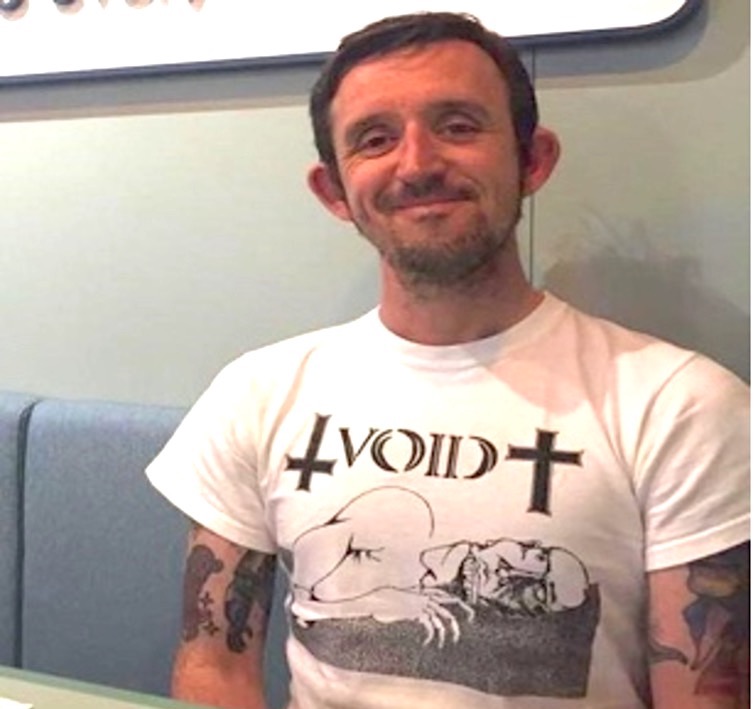
‘There are only three types of people: Those at the top, those at the bottom and those who fall.’ So begins The Platform (El Hoyo), a Spanish science fiction horror movie that marks the debut feature from director Galder Gaztelu-Urrutia. Proving to be a fan favourite at the 2019 Toronto International Film Festival, The Platform is now streaming globally on Netflix.
Goreng (Ivan Massagué) wakes up in a cell. Opposite, his cellmate Trimagasi (Zorion Eguileor), an older man who seems to have been there for a while. Trimagasi explains the situation. The facility is known as The Hole and its grey, brutalist architecture is divided up into an unknown, but massive number of levels. They can be observed via an opening in the centre of the cell through which a platform travels daily. The platform contains the inmates’ food allowance. The catch? There is only one serving for the entire facility. So, the inmates’ only source of food is what those above leave for them.
Goreng arrives as a volunteer, with the promise of an accredited diploma for his six months inside. Others are inside for punitive reasons. At the end of each month the cellmates are moved to a different level and must contend with either an abundance of food or a complete lack of it. Those on the lower levels find they must invariably turn to… ‘alternative’ food sources.
Matters are further compounded when Goreng meets the mysterious Miharu (Alexandra Masangkay), a woman travelling on the platform in the hope of finding her missing daughter.

First impressions prove to be accurate as The Platform takes the sparse, dingy ambiguity of Cube, whisks it up with the sociological research of Das Experiment, and sprinkles on the class struggle from Snowpiercer, High-Rise and, you know, real life.
Further similarities to Vincenzo Natali’s Cube arise in the dark, shadowy visual style; both movies play with a concept that puts the protagonists in a situation that is both physically and morally unbearable. They also share similar uncertainty as the occupants do not know precisely why they are here or who is behind it. The Platform cites only the mysterious Administration as the organisation in charge.
The tight confines of the cell give Gaztelu-Urrutia a minimal world, from which he extracts maximum tension. The Platform could almost be chamber play in regards to its setting. Although the characters move to different levels, the entire film takes place in what is essentially the same room.

They say that art reflects the society in which it was created. It’s why the 1970s gave us such fine cinematic misanthropy, while the ’80s spawned punk bands with such genuine anger it defined genres for decades to come. People don’t like the direction in which they see us headed and they react. The Platform is such a reaction.
Consider The Platform an allegory for capitalism’s failings, as it pours scorn upon the myth of trickle-down economics. The upper levels gorge themselves on fancy cuisine while the lowest levels get scraps – if anything at all. The struggle of life at the bottom is brought into sharp contrast with those at the top, as we see the food being prepared in the opulent kitchen of what appears to be a high end restaurant.
The Platform is particularly prescient in light of current news events. One character attempts to correct the disparity between the higher and lower floors by explaining that if everyone ate what they needed, there would be enough food for all. Even going so far as to divide the food into portions for the floor below, asking them to do the same for the floor below them, and so on. But the other floors do not listen. They gorge themselves in the belief they are entitled to as much as they want. It’s a blunt, yet staggeringly appropriate comparison to the behaviour we’ve seen in response to COVID-19. The equivalent levels of self-entitlement have resulted in panic buying and refusal to isolate, something that has become depressingly commonplace of late.

The saddening realisation that people can be prone to great selfishness and too often cannot be trusted to do the right thing is further cemented in The Platform, as those on top refuse to question the status quo as long as they are provided for. It is only Goreng’s eventual threats that force some of the lower levels into helping.
The Platform is not for everyone. If the concept isn’t too weird for broad appeal, the violence probably is. As events start to go sideways, The Platform becomes a grisly and bloody affair. It’s raw and visceral and not afraid to make you uncomfortable.
Beyond that, The Platform keeps the audience on its toes and although no one could ever accuse it of subtlety, it asks us to ponder some interesting questions about society and human nature. It’s also just an original, intriguing and exciting piece of sci-fi horror, and fans of the genre will be hard pushed to find anything as opinionated or as off-kilter as The Platform.
‘The Platform’ can be seen on Netflix – right HERE.













